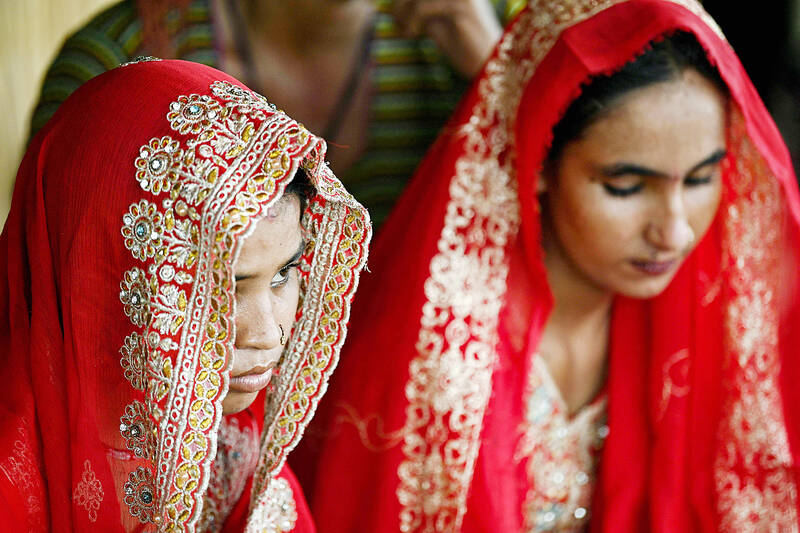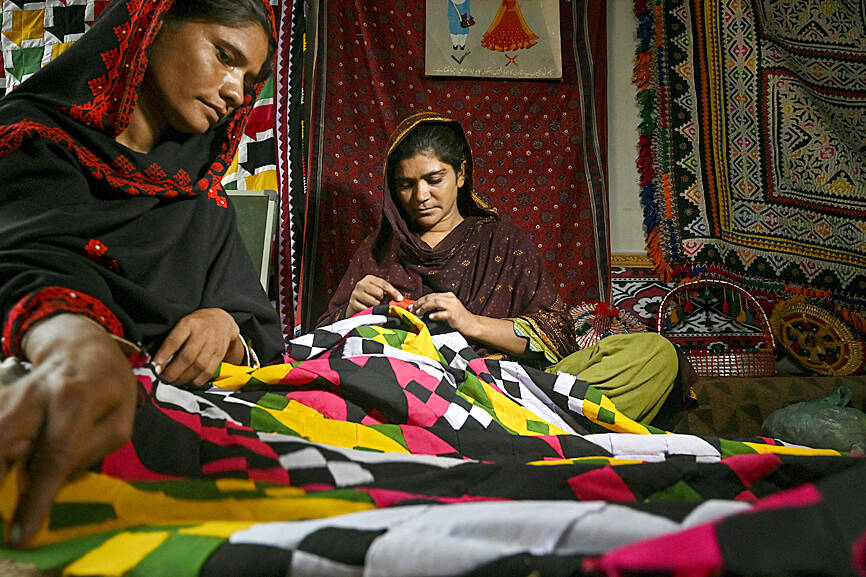As monsoon rains were about to break over Pakistan, 14-year-old Shamila and her 13-year-old sister Amina were married off in exchange for money, a decision their parents made to help the family survive the threat of floods.
“I was happy to hear I was getting married... I thought my life would become easier,” Shamila said after her wedding to a man twice her age in hope of a more prosperous life. “But I have nothing more, and with the rain, I fear I will have even less, if that is possible.”
Pakistan’s high rate of marriages for underage girls had been inching lower in the past few years, but after unprecedented floods in 2022, rights workers say that such weddings are on the rise due to climate-driven economic insecurity.

Photo: AFP
The summer monsoon between July and September is vital for the livelihoods of millions of farmers and food security, but scientists say climate change is making them heavier and longer, raising the risk of landslides, floods and long-term crop damage.
Many villages in the agricultural belt of Sindh Province have not recovered from the 2022 floods, which plunged one-third of the country underwater, displaced millions and ruined harvests.
“This has led to a new trend of ‘monsoon brides,’” said Mashooque Birhmani, the founder of the non-governmental organization Sujag Sansar, which works with religious academics to combat child marriage.

Photo: AFP
“Families will find any means of survival. The first and most obvious way is to give their daughters away in marriage in exchange for money,” Birhmani said.
Since the 2022 floods, child marriage has spiked in villages in Dadu District, one of the worst-hit areas that for months resembled a lake, he said.
In Khan Mohammad Mallah village, where Shamila and Amina were married in a joint ceremony in June, 45 underage girls have become wives since the last monsoon.
Fifteen of them were married in May and June.
“Before the 2022 rains, there was no such need to get girls married so young in our area,” village elder Mai Hajani, 65, said. “They would work on the land, make rope for wooden beds, the men would be busy with fishing and agriculture. There was always work to be done.”
Parents said that they hurried the marriage of their daughters to save them from poverty, usually in exchange for money.
Shamila’s mother-in-law, Bibi Sachal, said they gave 200,000 rupees (US$720.86) to the young bride’s parents — a major sum in a region where most families survive on about US$1 a day.
Najma Ali was initially swept up in the excitement of becoming a wife when she married at 14 in 2022 and began living with her in-laws, as is tradition in Pakistan.
“My husband gave my parents 250,000 rupees for our wedding, but it was on loan [from a third party] that he has no way of paying back now,” she said.
“I thought I would get lipstick, makeup, clothes and crockery,” she said, cradling her six-month-old baby. “Now I am back home with a husband and a baby because we have nothing to eat.”
Their village, which lies on the banks of a canal in the Main Nara Valley, is barren and there are no fish left in the polluted water. Its stench overwhelms the area.
“We had lush rice fields where girls used to work,” said Hakim Zaadi, 58, the village matron and Najma’s mother.
“They would grow many vegetables, which are all dead now because the water in the ground is poisonous. This has happened especially after 2022,” she added. “The girls were not a burden on us before then. At the age girls used to get married, they now have five children, and they come back to live with their parents because their husbands are jobless.”
Child marriages are common in parts of Pakistan, which has the sixth-highest number of girls married before the age of 18 in the world, government data published in December last year showed.
The legal age for marriage varies from 16 to 18 in different regions, but the law is rarely enforced.
The UN Children’s Fund has reported “significant strides” in reducing child marriage, but evidence shows that extreme weather events put girls at risk.
“We would expect to see an 18 percent increase in the prevalence of child marriage, equivalent to erasing five years of progress,” it said in a report after the 2022 floods.
Dildar Ali Sheikh, 31, had planned to marry off his eldest daughter Mehtab while living in an aid camp after being displaced by the floods.
“When I was there, I thought to myself: ‘We should get our daughter married so at least she can eat and have basic facilities,’” the daily wage laborer said.
Mehtab was 10 years old at the time.
“The night I decided to get her married, I couldn’t sleep,” said her mother, Sumbal Ali Sheikh, who was 18 when she married.
An intervention from Sujag Sansar led to the wedding being postponed, and Mehtab was enrolled in a sewing workshop, allowing her to earn a small income while continuing her education.
However, when the monsoon rains fall, she is overcome by dread that her promised wedding would also arrive.
“I have told my father I want to study,” she said. “I see married girls around me who have very challenging lives and I don’t want this for myself.”

Anna Bhobho, a 31-year-old housewife from rural Zimbabwe, was once a silent observer in her home, excluded from financial and family decisionmaking in the deeply patriarchal society. Today, she is a driver of change in her village, thanks to an electric tricycle she owns. In many parts of rural sub-Saharan Africa, women have long been excluded from mainstream economic activities such as operating public transportation. However, three-wheelers powered by green energy are reversing that trend, offering financial opportunities and a newfound sense of importance. “My husband now looks up to me to take care of a large chunk of expenses,

SECTOR LEADER: TSMC can increase capacity by as much as 20 percent or more in the advanced node part of the foundry market by 2030, an analyst said Taiwan Semiconductor Manufacturing Co (TSMC, 台積電) is expected to lead its peers in the advanced 2-nanometer process technology, despite competition from Samsung Electronics Co and Intel Corp, TrendForce Corp analyst Joanne Chiao (喬安) said. TSMC’s sophisticated products and its large production scale are expected to allow the company to continue dominating the global 2-nanometer process market this year, Chiao said. The world’s largest contract chipmaker is scheduled to begin mass production of chips made on the 2-nanometer process in its Hsinchu fab in the second half of this year. It would also hold a ceremony on Monday next week to

TECH CLUSTER: The US company’s new office is in the Shalun Smart Green Energy Science City, a new AI industry base and cybersecurity hub in southern Taiwan US chip designer Advanced Micro Devices Inc (AMD) yesterday launched an office in Tainan’s Gueiren District (歸仁), marking a significant milestone in the development of southern Taiwan’s artificial intelligence (AI) industry, the Tainan City Government said in a statement. AMD Taiwan general manager Vincent Chern (陳民皓) presided over the opening ceremony for the company’s new office at the Shalun Smart Green Energy Science City (沙崙智慧綠能科學城), a new AI industry base and cybersecurity hub in southern Taiwan. Facilities in the new office include an information processing center, and a research and development (R&D) center, the Tainan Economic Development Bureau said. The Ministry

State-run CPC Corp, Taiwan (CPC, 台灣中油) yesterday signed a letter of intent with Alaska Gasline Development Corp (AGDC), expressing an interest to buy liquefied natural gas (LNG) and invest in the latter’s Alaska LNG project, the Ministry of Economic Affairs said in a statement. Under the agreement, CPC is to participate in the project’s upstream gas investment to secure stable energy resources for Taiwan, the ministry said. The Alaska LNG project is jointly promoted by AGDC and major developer Glenfarne Group LLC, as Alaska plans to export up to 20 million tonnes of LNG annually from 2031. It involves constructing an 1,290km